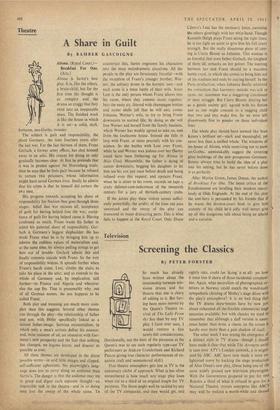Theatre
,A Share in Guilt
By BAMBER GASCOIGNE Altona. (Royal Court.)— Breakfast For One. (Arts.) The subject is guilt and responsibility, the place Germany, the time fourteen years after the last war. For the last thirteen of them, Franz Gerlach, a former army officer, has shut himself away in an attic. His reason for doing so only gradually becomes clear. At first he pretends that it was in protest against the Nuremberg trials; then he says that he feels guilt because he refused to torture two prisoners, whose information might have saved German lives; finally he admits that his crime is that he himself did torture the two men.
His progress towards accepting his share of responsibility for Nazism thus goes through three stages: belief that war excuses all; acceptance of guilt for having helped lose the war; accep- tance of guilt for having helped cause it. Having confessed so much, Franz wants his father to admit his paternal share of responsibility. Ger- lach is Germany's biggest shipbuilder. He has made Franz what he is by bringing him up to admire the ruthless values of materialism and, at the same time, by always pulling strings to get him out of trouble. Gerlach admits this and finally Commits suicide with Franz. So the web of responsibility widens. It spreads further when Franz's harsh sister, Leni, climbs the stairs to take his place in the attic; and so extends to the whole of Germany and, by implication, still further—to France and Algeria and wherever else the cap fits. That is presumably why, out of all German names, the son happens to be called Franz.
Both plot and meaning are much more com- plex than this suggests. Several other themes run through the play—the relationship of father and son, with Hitler specifically linked as a second father-image; Sartrian existentialism, in which only a man's actions define his essence; and, most insistent of all, an obsession with Ger- many's new prosperity and the fear that nothing has changed, no, leisons learnt, and disaster as possible as ever.
All these themes are developed in the driest possible terms—in arid little images and clipped, self-sufficient aphorisms. No playwright's lang- uage does less to carry along an audience than Sartre's. The danger is that the audience may try to grasp and digest each separate thought—an impossible task in the theatre—and in so doing .may lose the sweep of the whole scene. To counteract this, Sartre engineers his characters into the most melodramatic situations. All the people in the play are ferociously forceful—with the exception of Franz's younger brother, Wer- ner, the solitary drone in the hornets' nest—and each scene is a tense battle of their wills Sister Leni is the only person whom Franz allows into his room, where they commit incest together. Into the nasty sty, littered with champagne bottles and oyster shells (all that he will eat), conies Johanna, Werner's wife, to try to bring Franz downstairs to normal life; by doing so she will free Werner and herself from the family business, which Werner has weakly agreed to take on, and from the loathsome house. Instead she falls in love with Franz, or more precisely with his con- science. So she battles with Leni over Franz, while he and Werner wax jealous over her (Sartre could have been limbering up for Altona in Ibis Clos). Meanwhile, the father is dying of cancer downstairs, begging his daughter to let him see his son just once before death and being refused even this request; and upstairs Franz, when he is alone in his room, records on tape a crazy defence-cum-indictment of the twentieth century for a jury of thirtieth-century crabs.
If the actors play these violent scenes suffici- ently powerfully, the aridity of the lines can pass unnoticed and the sweep of the play can transcend its many distracting parts. This is what fails to happen at the Royal Court. Only Diane Cilento's Leni has the necessary force, caressing the others gloatingly with her whip-hand. Though Kenneth Haigh plays Franz along the right lines, he is too light an actor to give him his full crazy strength. But the really disastrous piece of cast- ing is Claire Bloom as Johanna. This woman is so forceful that even father Gerlach. the toughest of them all, remarks on her power. The meeting between her and Franz should be a macabre battle royal, in which she comes to bring him out of his madness and ends by staying herself. In the Paris production, when Johanna finally admitted his contention that Germany outside was still in runs. ner statement was a staggering concession it their struggle. But Claire Bloom, playing her Its a gentle society girl, agreed with his fiction just as one might concede to a nagging child that two and two make five. So we were left disastrously free to ponder on those individual lines The whole play should have seemed like Sean Kenny's brilliant set—stark and meaningful, yet never less than a unified whole. The windows of his house of Altona, while contriving not to seem un-Gothic, unmistakably suggest the towering glass buildings of the new prosperous Germany. Kenny always tries to build. the idea of a play into his setting, but he has never before done it so perfectly.
After Martin Green, James Doran, the author of Breakfast For One. The latest critics of the Establishment are levelling their muskets merci- lessly at Olde Englande. At the end of this play the anti-hero is persuaded by his friends that if he wants the divorce-court beak to give him custody of his child he'd jolly well better give up all this dangerous talk about being an atheist and a socialist.














































 Previous page
Previous page